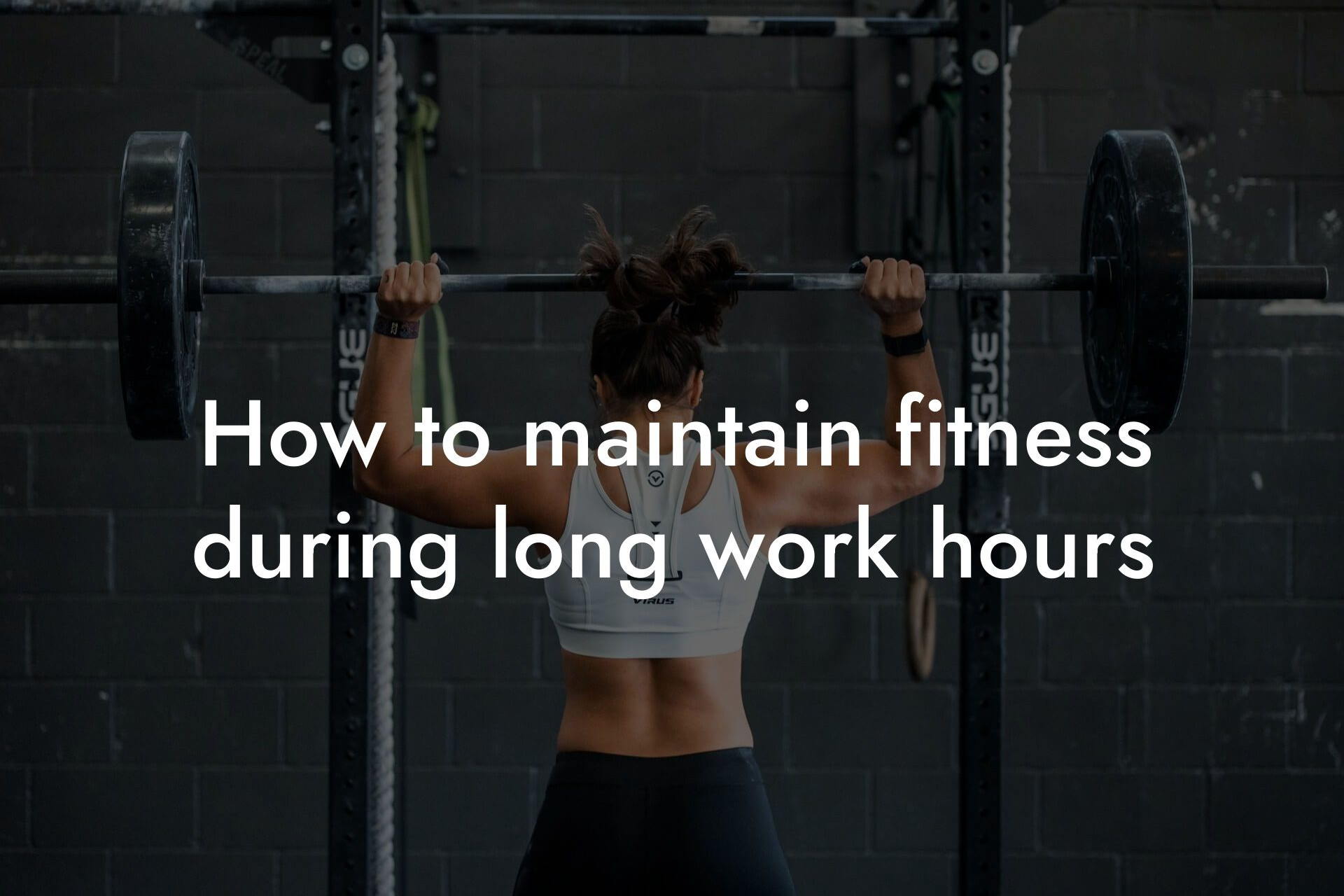As a high-earning professional, you understand the importance of maintaining a healthy and fit physique. However, social gatherings and business events often involve alcohol consumption, which can hinder your fitness goals if not managed properly. At Tano Performance Group, we believe that moderation is key to balancing your social life with your fitness aspirations. In this article, we will provide you with strategies for maintaining fitness while still enjoying a drink or two.
Table of Contents
- The Impact of Excessive Alcohol Consumption on Fitness
- Setting Boundaries: Defining Moderation
- Strategies for Maintaining Fitness While Enjoying a Drink
- The Importance of Nutrition in Maintaining Fitness
- The Role of Exercise in Maintaining Fitness
- Monitoring Your Progress with DEXA Scans
- Frequently Asked Questions
The Impact of Excessive Alcohol Consumption on Fitness
Excessive alcohol consumption can have detrimental effects on your fitness goals. Here are some of the ways in which alcohol can negatively impact your physique:
• Weight gain: Alcohol is high in calories, and excessive consumption can lead to weight gain, particularly around the midsection.
• Dehydration: Alcohol is a diuretic, causing your body to lose water and leading to dehydration. This can impede your workout performance and slow down your recovery.
• Inflammation: Chronic alcohol consumption can lead to chronic inflammation, which can cause muscle damage and slow down your progress.
• Hormonal imbalance: Excessive alcohol consumption can disrupt your hormonal balance, leading to decreased testosterone levels and increased estrogen levels, which can negatively impact your physique.
Setting Boundaries: Defining Moderation
So, what does moderation mean when it comes to alcohol consumption? The general consensus is that moderate drinking is defined as:
• For men: Up to 2 drinks per day, with a maximum of 14 drinks per week.
• For women: Up to 1 drink per day, with a maximum of 7 drinks per week.
A standard drink is defined as:
• 12 oz beer (5% ABV)
• 5 oz wine (12% ABV)
• 1.5 oz spirits (40% ABV)
Strategies for Maintaining Fitness While Enjoying a Drink
Now that we've established what moderation means, here are some strategies for maintaining fitness while still enjoying a drink or two:
• Plan ahead: If you know you'll be attending a social event or business gathering where alcohol will be served, plan your workouts and meals accordingly. Make sure you're well-hydrated and fueled before consuming alcohol.
• Choose low-calorie drinks: Opt for low-calorie drinks such as spirits with soda water or wine spritzers instead of high-calorie cocktails.
• Eat before drinking: Eating a meal or snack before consuming alcohol can help slow down the absorption of alcohol into your bloodstream, reducing its negative effects on your body.
• Stay hydrated: Drink plenty of water throughout the night to stay hydrated and reduce the risk of dehydration.
• Avoid binge drinking: Binge drinking can lead to excessive calorie consumption and dehydration. Pace yourself and drink responsibly.
The Importance of Nutrition in Maintaining Fitness
Nutrition plays a critical role in maintaining fitness, especially when consuming alcohol. Here are some tips for maintaining a healthy diet while still enjoying a drink or two:
• Focus on lean protein: Lean protein sources such as chicken, fish, and tofu can help support muscle growth and repair.
• Incorporate healthy fats: Healthy fats such as avocado, nuts, and seeds can help support hormone production and reduce inflammation.
• Eat complex carbohydrates: Complex carbohydrates such as whole grains, fruits, and vegetables can provide sustained energy and support muscle recovery.
• Stay hydrated: Drink plenty of water throughout the day to stay hydrated and support muscle function.
The Role of Exercise in Maintaining Fitness
Exercise is essential for maintaining fitness, and it's even more critical when consuming alcohol. Here are some tips for incorporating exercise into your routine:
• Prioritize strength training: Strength training can help support muscle growth and repair, which can be negatively impacted by excessive alcohol consumption.
• Incorporate cardio: Cardio exercises such as running, cycling, or swimming can help improve cardiovascular health and burn excess calories.
• Focus on high-intensity interval training (HIIT): HIIT involves short bursts of high-intensity exercise followed by brief periods of rest. This type of exercise can help improve insulin sensitivity and burn excess calories.
• Make it a habit: Aim to exercise at least 3-4 times per week, and make it a habit by scheduling it into your daily routine.
Monitoring Your Progress with DEXA Scans
At Tano Performance Group, we understand the importance of monitoring your progress to achieve your fitness goals. That's why we offer DEXA scans, which provide a comprehensive assessment of your body composition, including:
• Body fat percentage
• Lean muscle mass
• Bone density
• Visceral fat area
By monitoring your progress with DEXA scans, you can adjust your diet and exercise routine accordingly, ensuring that you're on track to achieving your fitness goals.
Maintaining fitness while enjoying a drink or two requires discipline, planning, and moderation. By setting boundaries, choosing low-calorie drinks, eating before drinking, staying hydrated, and avoiding binge drinking, you can enjoy social gatherings and business events without compromising your fitness goals. Remember to prioritize nutrition and exercise, and monitor your progress with DEXA scans to ensure that you're on track to achieving your fitness aspirations.
At Tano Performance Group, we're committed to helping high-earning professionals like you achieve their fitness goals. Contact us today to schedule your DEXA scan and take the first step towards a healthier, fitter you.
Frequently Asked Questions
What is considered moderate drinking?
According to the National Institute on Alcohol Abuse and Alcoholism (NIAAA), moderate drinking is defined as up to 4 drinks for men and 3 drinks for women on any given day, and a weekly total of 14 drinks for men and 7 drinks for women. It's essential to note that these are general guidelines, and individual tolerance and sensitivity to alcohol can vary greatly.
How does alcohol affect my fitness goals?
Alcohol can have a significant impact on your fitness goals, particularly when consumed excessively. It can lead to decreased muscle mass, increased body fat, and impaired athletic performance. Additionally, alcohol can disrupt hormone levels, including testosterone, which is essential for muscle growth and development.
Can I still drink and maintain a healthy physique?
Absolutely! Moderation is key. If you enjoy drinking, you don't have to give it up entirely. By being mindful of your consumption and incorporating strategies to minimize the negative effects of alcohol, you can still achieve your fitness goals. It's all about finding a balance that works for you.
What are some strategies for maintaining fitness while drinking?
Some effective strategies include staying hydrated, eating nutrient-dense foods, incorporating strength training and high-intensity interval training (HIIT) into your workout routine, and getting adequate sleep. Additionally, consider alternative low-calorie drinks, and pace yourself to avoid overconsumption.
How does dehydration affect my workout performance?
Dehydration can significantly impair your workout performance, leading to decreased strength, endurance, and flexibility. Even mild dehydration can cause fatigue, headaches, and dizziness, making it challenging to push yourself during a workout. Staying hydrated is crucial, especially when consuming alcohol.
What are some healthy alternatives to beer?
If you're looking for a lower-calorie alternative to beer, consider trying spirits like vodka, gin, or rum, paired with a low-calorie mixer like soda water or diet tonic. You can also opt for wine or champagne, which tend to be lower in calories than beer.
Can I drink protein shakes with alcohol?
While it may seem like a good idea to combine protein shakes with alcohol, it's not the best approach. Alcohol can interfere with protein absorption, making it less effective for muscle recovery and growth. Instead, consume your protein shake before or after your workout, and avoid mixing it with alcohol.
How does alcohol affect my bone density?
Excessive alcohol consumption can lead to a decrease in bone density, particularly in older adults. This is because alcohol can interfere with calcium absorption, leading to weaker bones. However, moderate drinking is unlikely to have a significant impact on bone density.
What are some tips for staying hydrated while drinking?
To stay hydrated while drinking, aim to drink at least one glass of water for every alcoholic beverage consumed. You can also try drinking a full glass of water before bed to help rehydrate your body after a night of drinking.
Can I still get a good workout while hungover?
While it may be challenging, it's not impossible to get a good workout while hungover. However, it's essential to listen to your body and adjust your intensity and duration accordingly. Start with a low-intensity workout, and gradually increase as you feel more comfortable.
How does alcohol affect my body fat percentage?
Alcohol can contribute to an increase in body fat percentage, particularly around the midsection. This is because alcohol is high in empty calories, which can lead to weight gain and fat storage. Additionally, excessive drinking can disrupt hormone levels, leading to increased fat storage.
What are some healthy snacks to eat while drinking?
Opt for healthy snacks like nuts, fruits, and veggies, which can help slow down the absorption of alcohol and provide essential nutrients. Avoid salty or high-calorie snacks, which can exacerbate dehydration and contribute to weight gain.
Can I drink on an empty stomach?
It's best to avoid drinking on an empty stomach, as this can lead to faster absorption of alcohol and increased intoxication. Eating a meal or snack that includes protein and complex carbohydrates can help slow down the absorption of alcohol and reduce its negative effects.
How does alcohol affect my muscle recovery?
Alcohol can impede muscle recovery by reducing protein synthesis, increasing muscle damage, and disrupting hormone levels. However, moderate drinking is unlikely to have a significant impact on muscle recovery. It's essential to prioritize post-workout nutrition and hydration to support muscle recovery.
What are some low-calorie mixers I can use?
Some low-calorie mixers you can use include soda water, diet tonic, and sparkling water with a squeeze of fresh lime or lemon juice. You can also try using low-calorie juices like cranberry or grapefruit.
Can I drink during a workout?
It's not recommended to drink during a workout, as alcohol can impair your judgment, reaction time, and overall performance. Additionally, alcohol can lead to dehydration, which can further exacerbate the negative effects of exercise.
How does alcohol affect my athletic performance?
Alcohol can negatively impact athletic performance by reducing reaction time, speed, and endurance. It can also lead to dehydration, decreased strength, and impaired judgment, making it challenging to perform at your best.
What are some strategies for reducing hangover symptoms?
Some effective strategies for reducing hangover symptoms include staying hydrated, eating a balanced meal before bed, taking a multivitamin, and getting adequate sleep. You can also try taking supplements like activated charcoal or B vitamins to help alleviate symptoms.
Can I still achieve my fitness goals if I drink occasionally?
Absolutely! Occasional drinking is unlikely to significantly impact your fitness goals, as long as you're mindful of your overall diet and training regimen. It's essential to prioritize your fitness goals and make healthy choices most of the time.
How does alcohol affect my testosterone levels?
Excessive alcohol consumption can lead to a decrease in testosterone levels, which can negatively impact muscle growth and development. However, moderate drinking is unlikely to have a significant impact on testosterone levels.
What are some healthy ways to cope with stress instead of drinking?
Some healthy ways to cope with stress include exercise, meditation, yoga, and deep breathing techniques. You can also try journaling, reading, or spending time with friends and family to help manage stress.
Can I drink and still maintain a healthy diet?
Absolutely! You can still maintain a healthy diet while drinking, as long as you're mindful of your overall calorie intake and nutrient balance. Focus on whole, nutrient-dense foods, and limit your consumption of processed and high-calorie foods.
How does alcohol affect my sleep quality?
Alcohol can disrupt sleep quality by reducing the amount of deep sleep and REM sleep you get. This can lead to fatigue, decreased performance, and impaired recovery. It's essential to prioritize sleep and establish a consistent sleep schedule.
Here are some related articles you might love...
- How to maintain body composition during business travel
- How to maintain fitness during long work hours
- Building a home gym for busy professionals
- Sustainable habits for lifelong fitness
- The role of community in achieving fitness goals
- The impact of smoking on body composition and bone health
- Weekend warrior fitness: How to stay consistent
- Balancing social life and fitness goals
- The benefits of morning workouts for professionals
Zak Faulkner
Zak Faulkner is a leading authority in the realm of physical health and body composition analysis, with over 15 years of experience helping professionals optimise their fitness and well-being. As one the experts behind Tano Performance Group, Zak has dedicated his career to providing in-depth, science-backed insights that empower clients to elevate their physical performance and overall health.
With extensive knowledge of DEXA technology, Zak specializes in delivering comprehensive body assessments that offer precise data on body fat, muscle mass, bone density, and overall physique. His expertise enables individuals to make informed decisions and achieve their fitness goals with accuracy and confidence. Zak’s approach is rooted in a deep understanding of human physiology, combined with a passion for helping clients unlock their full potential through personalised strategies.
Over the years, Zak has earned a reputation for his commitment to excellence, precision, and client-focused service. His guidance is trusted by top professionals who demand the best when it comes to their health. Whether advising on fitness programs, nutritional strategies, or long-term wellness plans, Zak Faulkner’s insights are a valuable resource for anyone serious about taking their health and fitness to the next level.
At Tano Performance Group, Zak continues to lead our Content Team revolutionising how professionals approach their physical health, offering unparalleled expertise that drives real results.




